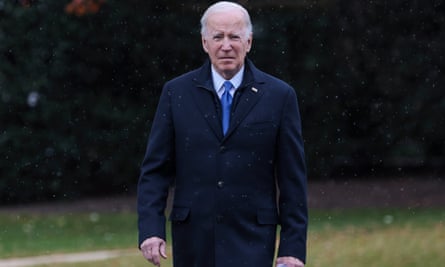Joe Biden has said that he is not considering sending US troops to defend Ukraine in response to a Russian military buildup on the country’s borders.
“That is not on the table,” he told reporters on Wednesday, one day after speaking directly with Vladimir Putin in an effort to avert a military crisis.
Biden has warned Putin that there would be “severe consequences” if Russia launches an attack on Ukraine and said the US would be providing “defensive capabilities” to the Ukrainian military.
Biden also said that he was hoping to announce “meetings at a higher level” between Russia and at least four Nato members in an effort to address the Kremlin’s complaints about the military alliance. Biden said he hoped to be able to announce the meetings by Friday.
The talks would include “at least four of our major Nato allies and Russia to discuss the future of Russia’s concerns relative to Nato writ large and … bringing down the temperature along the Eastern Front”.
Those talks could match the “discussion of strategic security on the continent” that Kremlin said it was expecting in remarks after the high-stakes talks between Biden and Putin.

“I want to emphasise once again: the talks were very open, substantive, and I would say constructive. In any case, I hope the US side feels the same way about the results of our meeting,” Putin told reporters on Wednesday.
“We can continue this dialogue. It seems to me that’s the main thing.”
Biden and Putin appeared to make little headway during their virtual summit on Tuesday, trading accusations over the Russian military buildup near Ukraine and the potential for new economic sanctions against Moscow.
The US had not indicated it is ready to hold the same negotiations that the Kremlin wants.
But the Kremlin statements indicate that Russia is not yet abandoning talks, while leaving an estimated 100,000 troops within striking distance of Ukraine.
“#Putin-#Biden video call has been useful,” wrote Dmitry Trenin, the head of the Moscow Carnegie Center. “Acknowledging each other’s security concerns is key. Reviving channel on [Ukraine] can help avoid misunderstanding … War fears in west will not subside just yet, but jaw jaw is better than war war.”
Dmytro Kuleba, the Ukrainian foreign minister, said “the contact itself serves [as] deterrence and de-escalation”, Reuters reported. “We appreciate the crucial diplomatic engagement of the US in efforts to bring Russia back to the table of negotiations.”
Biden is scheduled to speak with the Ukrainian president, Volodymyr Zelenskiy, on Thursday.
Russia and the US each gave vague confirmations for further talks, but the exact subject of those talks and when they would be held has remained unclear.
Russia has said it wants “legal guarantees” to limit any further eastward expansion of Nato and the placement of missile systems in Ukraine or other countries bordering Russia. That would indicate Moscow is seeking a new treaty with the alliance, which is likely to anger some members.
Russia has also demanded that Biden compel Ukraine to open direct talks with Russian-backed separatists, a non-starter in Kyiv.
The White House wants Russia to reduce the threat of an invasion as a condition for discussions, and Biden has warned the Kremlin of specific sanctions that could result from a new Russian offensive into Ukraine. The US and Ukraine fear that Moscow could be planning an operation beginning in late January.
The two leaders talked by videoconference for more than two hours, a format Putin enjoyed, Peskov said.
The US national security adviser, Jake Sullivan, said: “The discussion between president Biden and president Putin was direct and straightforward. There was a lot of give and take, there was no finger-wagging. But the president was crystal clear about where the United States stands on all of these issues.”
After the call, Biden spoke to the leaders of the UK, Germany, France and Italy by conference call. The president had consulted them on Monday, and the White House said they had agreed “to stay in close touch on a coordinated and comprehensive approach in response to Russia’s military buildup on Ukraine’s borders”.







